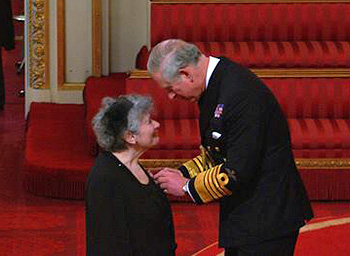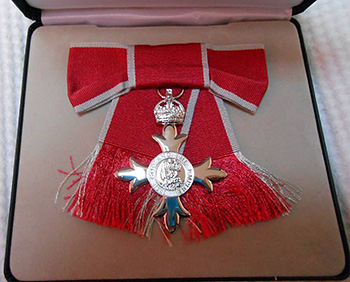British award recognizes scientist's contributions to public health

Prince Charles pinned the Member of the Most Excellent Order of the British Empire medal to Natalie Teich's lapel during a February 12, 2014 ceremony at Buckingham Palace. Photo: Provided.
In 1982, Natalie Teich '65 and her colleagues at the Imperial Cancer Research Fund in London identified the v-Fos retroviral oncogene, a key gene involved in cancer. This discovery inspired a flood of research. Within two years of her discovery, nearly 5,000 papers had been published on related topics.
"You'd now say it 'went viral,'" she says.
Teich made a significant impact on cancer research, but for her volunteer work in public health Teich became a Member of the Most Excellent Order of the British Empire this year. (The awards recognize British citizens who have made major contributions to various fields. This year, three of the 468 awardees were Cornellians, including Donald Allan Cameron, M.S. '63, founder and managing director of Cameron Balloons, for his service to design and manufacturing, and Katharine Whitehorn Lyall, once a Cornell graduate student [M.S. '55], for service to journalism.)
Prince Charles pinned the medal to Teich's lapel during a February 12, 2014 ceremony at Buckingham Palace.

Teich's Member of the Most Excellent Order of the British Empire medal. Photo: Provided.
"It was quite fun," she says.
One man honored during the ceremony was the current barber of Prime Minister David Cameron, who was recognized for his contributions to regulation of the barbering industry.
Teich says that about one thousand people a year receive "gongs," as the awards are affectionately known. She has worked tirelessly since her retirement from research science in 1995 to improve the British National Health System and to connect citizens to health services.
Teich first volunteered by writing leaflets to women and their families about diseases, treatments and procedures. She then served on a committee that checked up on health services -- general practitioners, nursing homes and other facilities -- in one of London's 33 boroughs. This task took her into areas of the city she knew little about, such as a Muslim community center where she heard women's concerns and gave advice about seeking access to appropriate medical services.
Teich now volunteers for Transforming Cancer Services for London, part of England's National Health Services that focuses on restructuring cancer services in the city. She has been on board since the beginning of the restructuring and serves on a committee charged with increasing early detection of cancer.
"Britain does poorly in cancer outcomes, compared to other European countries, and London often fares worse than the rest of the country," says Teich. "It's for cultural reasons, in part; the famous British 'stiff upper lip' prevents many people from admitting they are sick and seeking treatment early." She is involved in a campaign to bring cancer care in the United Kingdom up to the level of the best in Europe.
Looking back on her professional career, Teich says she is proudest of the work for which she didn't receive any awards. Discovering the v-Fos retroviral oncoprotein, she says, was like finding the key piece of a jigsaw puzzle that allowed other researchers to contribute their pieces.
She decided on a career in research while an undergraduate bacteriology (now known as microbiology) major at Cornell. She went on to earn a Ph.D. in virology at the University of Rochester and worked as a fellow at the National Institute of Allergy and Infectious Diseases. Then, a two-year post doctoral position at a cancer research fund in England was extended "a bit" -- to a 40-year career.
Teich, born and raised in New York City, holds dual citizenship and resides in London. Since 1997, she has been president of the London Cornell Club, which she appreciates for the friendships and community it provides. She returns to the Ithaca campus once a year, to take part in Cornell University Council, of which she is a lifetime member.